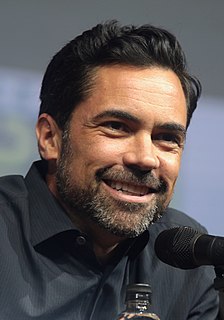A Quote by Ted Dekker
If Slater were someone else, Kevin would merely be the poor victim of a horrible plot. Unless he was killed by Slater, in which case he would be the dead victim of a horrible plot
Related Quotes
The main difference is, in 'Cold Case,' the victim sometimes had been dead for decades - you didn't have the advantage of being able to interview the victim. You had to piece together the circumstances surrounding the crime from witnesses and other evidence. 'SVU' is much more immediate in that you can talk to the victim.
I did this movie, 'A Walk Among the Tombstones' - I truly play a horrible, horrible individual in that - and I would occasionally go to the theater and watch what people's responses were, and they would laugh. He makes jokes, and people would respond to him in a human way. Then I've really done my job if I've humanized a really horrible person.
Being a victim doesn't take much. There are built-in excuses for failure. Built-in excuses for being miserable. Built-in excuses for being angry all the time. No reason to trying to be happy; it's not possible. You're a victim. Victim of what? Well, you're a victim of derision. Well, you're a victim of America. You're a victim of America's past, or you're a victim of religion. You're a victim of bigotry, of homophobia, whatever. You're a victim of something. The Democrats got one for you. If you want to be a victim, call 'em up.
Fiction writers come up with some interesting metaphors when speaking of plot. Some say the plot is the highway and the characters are the automobiles. Others talk about stories that are "plot-driven," as if the plot were neither the highway nor the automobile, but the chauffeur. Others seem to have plot phobia and say they never plot. Still others turn up their noses at the very notion, as if there's something artificial, fraudulent, contrived.
Capital punishment is the most premeditated of murders, to which no criminal's deed, however calculated can be compared. For there to be an equivalency, the death penalty would have to punish a criminal who had warned his victim of the date at which he would inflict a horrible death on him and who, from that moment onward, had confined him at his mercy for months. Such a monster is not encountered in private life.
When you're a victim, you automatically have a built-in excuse for failure. When you are a victim, it's always somebody else's fault. When you're a victim, success is not possible. When you are a victim of something, you are acknowledging that you are as far as you're gonna get, and you can't get any further, because there are more powerful forces arrayed against you than the force of yourself against it.
The plot is very important because writers have to play fair with their readers, but no one would care about the plot if the character work wasn't there. So, basically every book I work on starts with me thinking not just about the bad thing that's going to happen, but how that bad thing is going to ripple through the community, the family of the victim, and the lives of the investigators. I am keenly aware when I'm working that the crimes I am writing about have happened to real people. I take that very seriously.
































